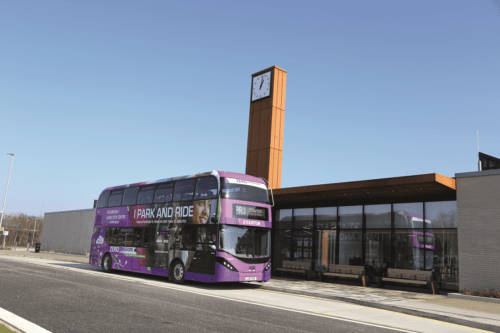
More funding for buses in the North and Midlands, along with an extension to the £2 fare cap, are beneficiaries of the decision to cancel part of the HS2 rail project
Billions of pounds which were to be spent on the now-cancelled northern arm of the HS2 high speed rail line, which has been curtailed to run between London and Birmingham, will be spent on other transport projects across the north and Midlands, Prime Minister Rishi Sunak announced on 4 October. Originally, every pound spent on HS2 was expected to deliver £2.30 worth of benefits back to the taxpayer. Despite revising the scope, it is now believed that the benefits could fall as low as 80 pence for every £1 spent, and the Government acknowledges that the Covid-19 pandemic has had a significant ongoing effect on travel patterns which render the original analysis outdated.
The money is to be redirected to build ’Network North’ and fund a raft of transport projects across the country, with rail, roads and buses set to benefit from £36 billion in transport improvements in what the Government says is a fundamental shift to how it invests in transport infrastructure. A further £12bn has been set aside to deliver fast links between Liverpool and Manchester.
Network North promises to drive better connectivity across the North and Midlands with faster journey times, increased capacity and more frequent, reliable services across rail, buses and roads.
According to the Government, more than four million people in cities in the North cannot currently reach their city centre by public transport within half an hour, which it says is detrimental to productivity and economic growth.
Towns, cities and rural areas in the North are promised improved transport infrastructure sooner, through £19.8 billion of funding to include £2.5 billion to deliver a new mass transit system in West Yorkshire, nearly £4 billion more funding for local transport in the North’s six city regions, a new £2.5 billion fund for local transport across all areas in the North outside the six city regions, a new £3.3 billion fund for road resurfacing, and investment in roads as well as a number of railway projects.
A further £9.6 billion will be invested in the Midlands, including over £1.5 billion guaranteed local transport funding for the new East Midlands Mayor, over £1 billion extra local transport funding for West Midlands City Region, and a new £2.2 billion fund for local transport across all areas in the West and East Midlands outside the city regions, alongside other rail and road projects.

£6.5 billion will be spent across the rest of the country, again on a mix of rail, road and bus projects, including the retention of the England-wide £2 adult single fare cap until the end of 2024, in place of the expected rise to £2.50.
Whilst a lot of of the funding has been redistributed to other rail projects, large sums are also promised for upgrading and repairing of major roads around the country. Meanwhile, Wales will benefit from £1 billion to improve transport connectivity, chiefly targeted at rail improvements and electrification, whilst Scotland will benefit from a scheme to reduce congestion for the communities of Ashington, Felton, Alnwick, and Amble by delivering the long-awaited upgrade to the A1 coastal route between Newcastle, Berwick-upon-Tweed, and Edinburgh and improvements to the A75 which provides a vital link to the Cairnryan ferry terminals serving Northern Ireland and south-west Scotland.
Responding to the news, CPT CEO Graham Vidler welcomed what he said was a long overdue funding package for bus services in the North and Midlands: “We welcome the further funding for bus fares in England. This will help make buses more attractive for passengers during a cost of living crisis. However, the Government is giving the sector mixed messages through its imagined war on motorists. It has been two years since the National Bus Strategy claimed there should be bus lanes wherever required. The Government is now undermining the few that are already in place.
“We must move away from a procession of short-term fixes and instead build a long-term sustainable settlement to unlock the economic, net zero and social well-being potential of buses. The continued absence of a funded long-term plan is undermining the confidence of industry to invest, and deterring passengers from choosing to use the bus.”
“The investment shows a recognition of the value of buses to the economy and, building on operators’ own innovation and investment, has the potential to grow the network substantially. Operators will now study the detail of the Government’s proposals and work with local authority partners to make it a success, and ensure it delivers the improvements that passengers want.
“This is not job done. The National Bus Strategy highlighted the potential to improve bus networks across the whole country.”


